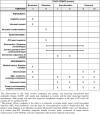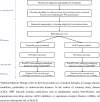Rationale and design of randomized non-inferiority clinical trial to compare the safety and efficacy of ticagrelor monotherapy with dual antiplatelet therapy in chronic coronary syndrome patients post percutaneous coronary intervention (TICALONE-TAHA10 Protocol)
- PMID: 40668853
- PMCID: PMC12266445
- DOI: 10.1371/journal.pone.0325663
Rationale and design of randomized non-inferiority clinical trial to compare the safety and efficacy of ticagrelor monotherapy with dual antiplatelet therapy in chronic coronary syndrome patients post percutaneous coronary intervention (TICALONE-TAHA10 Protocol)
Abstract
Background: Despite the wide variety of antiplatelet regimens and durations, the optimal treatment approach for chronic coronary syndrome (CCS) patients remains a subject of ongoing debate. While current guidelines recommend dual antiplatelet therapy (DAPT) with aspirin and clopidogrel, the development of drug-eluting stents (DES) and more potent agents has sparked interest in shorter DAPT regimens, followed by P2Y12 inhibitor monotherapy, as a potential alternative. Recent trials and meta-analyses have shown that this approach may provide similar protection against thrombotic events with reduced bleeding risk. Despite promising data, the safety and efficacy of Ticagrelor monotherapy specifically in CCS patients have not been rigorously tested in randomized trials.
Methods: TICALONE is a non-inferiority, two-arm, double-blinded, randomized controlled clinical trial designed to evaluate the safety and efficacy of ticagrelor monotherapy compared to DAPT in CCS patients following PCI. Eligible patients undergoing PCI with drug-eluting stents will be randomly assigned to receive either conventional DAPT (aspirin and clopidogrel) or ticagrelor monotherapy for six months. Follow-up visits will be conducted at 1, 3, 6, and 12 months post-PCI to assess efficacy and safety endpoints. The primary efficacy endpoint is a composite endpoint of cardiac death, myocardial infarction, stroke, stent thrombosis, and the need for revascularization. The primary safety endpoint is the occurrence of Bleeding Academic Research Consortium (BARC) type 3 or 5 bleeding events. The secondary endpoints include components of the primary efficacy endpoint, any bleeding event (BARC type 1-5), and all-cause mortality. Ancillary endpoints are other adverse events including dyspnea, drug adherence, and reaction. All endpoints will be monitored by a Data Safety Monitoring Board (DSMB) and Trial Management Committee (TMC). Statistical analysis and reporting of trial results will follow the estimand framework. Kaplan-Meier estimates will be used to assess event rates, while the log-rank test and Cox regression analysis will be employed to compare safety and efficacy outcomes between the groups.
Discussion: This trial may serve as a crucial step toward eliminating aspirin from post-PCI regimens, specifically in CCS patients. By comparing the safety and efficacy of Ticagrelor monotherapy with the conventional DAPT regimen and addressing potential risks of aspirin-free therapy and adverse events like dyspnea, this study could offer valuable insights into the possibility of P2Y12 monotherapy's safe adoption in this population.
Trial registration: TICALONE is registered at https://clinicaltrials.gov/ with the identifier NCT06509893.
Copyright: © 2025 Mirhosseini et al. This is an open access article distributed under the terms of the Creative Commons Attribution License, which permits unrestricted use, distribution, and reproduction in any medium, provided the original author and source are credited.
Figures


Similar articles
-
Indobufen versus aspirin after percutaneous coronary intervention in elderly patients with acute coronary syndrome.BMC Cardiovasc Disord. 2025 Jul 7;25(1):495. doi: 10.1186/s12872-025-04843-0. BMC Cardiovasc Disord. 2025. PMID: 40619357 Free PMC article.
-
Ticagrelor monotherapy versus ticagrelor plus aspirin in patients with chronic coronary syndrome and high ischaemic risk: a post hoc analysis of the TWILIGHT trial.EuroIntervention. 2025 May 16;21(10):550-559. doi: 10.4244/EIJ-D-24-00973. EuroIntervention. 2025. PMID: 40375766 Clinical Trial.
-
Stepwise dual antiplatelet therapy de-escalation in patients after drug coated balloon angioplasty (REC-CAGEFREE II): multicentre, randomised, open label, assessor blind, non-inferiority trial.BMJ. 2025 Mar 31;388:e082945. doi: 10.1136/bmj-2024-082945. BMJ. 2025. PMID: 40164448 Free PMC article. Clinical Trial.
-
De-escalation of dual antiplatelet therapy for patients with acute coronary syndrome after percutaneous coronary intervention: a systematic review and network meta-analysis.BMJ Evid Based Med. 2024 May 22;29(3):171-186. doi: 10.1136/bmjebm-2023-112476. BMJ Evid Based Med. 2024. PMID: 38242567
-
De-escalating Dual Antiplatelet Therapy to Ticagrelor Monotherapy in Acute Coronary Syndrome : A Systematic Review and Individual Patient Data Meta-analysis of Randomized Clinical Trials.Ann Intern Med. 2025 Apr;178(4):533-542. doi: 10.7326/ANNALS-24-03102. Epub 2025 Feb 18. Ann Intern Med. 2025. PMID: 39961108
References
-
- Members WC, Virani SS, Newby LK, Arnold SV, Bittner V, Brewer LC, et al. 2023 AHA/ACC/ACCP/ASPC/NLA/PCNA guideline for the management of patients with chronic coronary disease: a report of the American Heart Association/American College of Cardiology Joint Committee on Clinical Practice Guidelines. J Am College of Cardiol. 2023;82(9):833–955. - PubMed
-
- Vrints C, Andreotti F, Koskinas KC, Rossello X, Adamo M, Ainslie J, et al. 2024 ESC Guidelines for the management of chronic coronary syndromes: Developed by the task force for the management of chronic coronary syndromes of the European Society of Cardiology (ESC) endorsed by the European Association for Cardio-Thoracic Surgery (EACTS). European Heart J. 2024. doi: 10.1093/eurheartj/ehae177 - DOI - PubMed
-
- Benenati S, Galli M, De Marzo V, Pescetelli F, Toma M, Andreotti F, et al. Very short vs. long dual antiplatelet therapy after second generation drug-eluting stents in 35 785 patients undergoing percutaneous coronary interventions: a meta-analysis of randomized controlled trials. Eur Heart J Cardiovasc Pharmacother. 2021;7(2):86–93. doi: 10.1093/ehjcvp/pvaa001 - DOI - PubMed
-
- O’Donoghue ML, Murphy SA, Sabatine MS. The safety and efficacy of aspirin discontinuation on a background of a P2Y12 inhibitor in patients after percutaneous coronary intervention: a systematic review and meta-analysis. Circulation. 2020;142(6):538–45. doi: 10.1161/CIRCULATIONAHA.120.046251 - DOI - PubMed
Publication types
MeSH terms
Substances
Associated data
LinkOut - more resources
Full Text Sources
Medical
Miscellaneous

